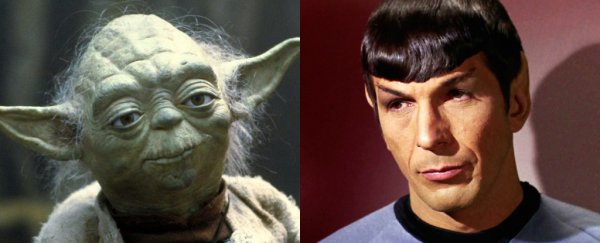One of them is a little green gnome-like figure. The other is half-human, half-Vulcan. Both have pointy ears and considerable wisdom. But which is ultimately wiser?
It's a reasonable thing to wonder, perhaps even logical. After all, Yoda from Star Wars and Spock from Star Trek have come to represent the quintessential archetypes of sage wisdom in the geeky annals of sci-fi culture… so which one should you invite along on trivia night?
Strange as it might seem, researchers have actually determined an answer of sorts to this hypothetical puzzle, courtesy of a new psychological study exploring the role emotions play within the process of reasoning.
"With our new study, we wanted to test how the presence and balance of multiple emotions at the same time influence one's ability for wise reasoning," says psychologist Igor Grossmann from the University of Waterloo.
To investigate this concept of emodiversity – the ability to experience a rich mixture of balanced emotional states – Grossmann and his team conducted a range of experiments over a period of four years with some 3,678 participants.
In six separate studies, the researchers investigated how emotional states impacted reasoning processes.
In one experiment, participants were asked to keep personal diaries, in which they would write about the most challenging event they experience each day.
In others they were interviewed about traumatic or life-changing events, or asked to report on their emotional reactions to a recent geopolitical event (in this case, conflict in Ukraine).
The researchers analysed the results in terms of characteristics associated with what's called wise reasoning, to determine whether emodiversity or down-regulating emotions enabled greater wisdom.
"On the one hand, work on emotional regulation suggests that down-regulating intense emotions may lead to wiser reasoning," the authors write.
"On the other hand, emerging work suggests that recognising and balancing emotions provides critical insights into life experiences, suggesting an alternative path to wiser reasoning."
The distinction between these two approaches to thinking about things neatly parallels the fictional philosophies of Yoda and Spock – while Yoda embraces his feelings (and teaches his students to do so) as part of the reasoning process, Spock effectively negates them so as to not be distracted by them.
It's a dichotomy not lost on the researchers.
"What unites both the grand master of the Jedi Order and the first officer of the Starship Enterprise are their critical acumen, their ability to reason through complex situations, and their selfless willingness to forego personal interests for the common good," the team explains.
"At the same time, these two icons differ fundamentally in their attitudes toward emotions."
According to the results of the experiments, Spock's down-regulating approach when it comes to emotions isn't actually the path to enlightenment, as wise reasoning "can also benefit from a rich and balanced emotional life", the paper explains.
"It seems that wise reasoning does not align with uniform emotional down-regulation, as portrayed by [Mr] Spock," Grossman says.
"Rather, wise reasoning accompanies one's ability to recognise and balance a wide range of emotions, as portrayed by Yoda."
In terms of why, it's broadly because, emodiversity – in terms of having a range and abundance of different emotions – provides valuable information about the features of situations, which enables people to make informed predictions of future actions.
Or, as Yoda might say: "Mind what you have learned… Save you it can!"
The findings are reported in the Journal of Experimental Psychology.
